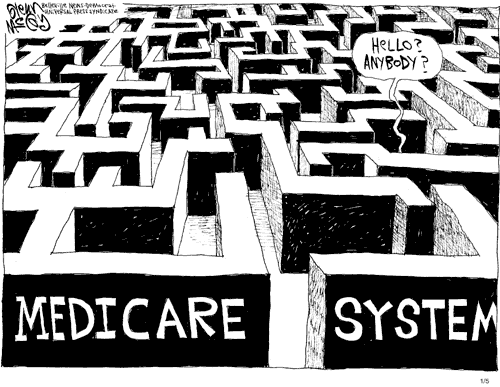
This is a guest blog from my dear friend The Road Less Traveled. The Road Less Traveled is a graduate of the Masters in Health Advocacy Program at Sarah Lawrence College. Her expertise in the field lies in helping consumers gain access to appropriate health care, as she has done with Medicare, Managed Care and Prescription Drugs.
Early in my career as a health advocate I had the amazing opportunity of counseling Medicare beneficiaries and training other advocates to do the same. What I learned through that process, in addition to my health policy and law studies in graduate school, was an invaluable lesson in how health care policy, from law to implementation, works in the
Medicare was put into law in 1965, in response to the critical need for older people and those with disabilities to be covered by health insurance. Medicaid was passed in the same bill, offering health insurance for people with low incomes. These populations are often vulnerable and refused by insurance companies due to their high costs of care and fixed incomes. We obviously saw a reason in 1965 to create health care coverage for people who otherwise would not be able to get it. It has been the closest form of a universal health program in the
There have been significant changes to Medicare since it was first passed. Most significantly, HMOs began coming to Medicare with the passage of the Balance Budget Act of 1997 (offering what are now known as Medicare Advantage plans). Prior to this, Medicare benefits could only be obtained by enrolling in a federal program administered solely by Medicare. Then in 2003, the Medicare Prescription Drug, Improvement, and Modernization Act (MMA) was passed, establishing an outpatient prescription drug benefit offered only through private plans. This was a substantial step in privatizing Medicare as beneficiaries could not get drug coverage under the traditional Medicare program.
The supposed advantage of receiving a drug benefit through only private insurers was that competition would allow for better choices of plans. There were a few flaws in this idea. First, insurers jumped on the chance to provide plans to the growing senior population, resulting in 50-60 plan choices within a region. Beneficiaries had to search through all of these plans to find out if their drugs were covered and for how much. Imagine your grandparents or great-grandparents trying to search online between 50 drug plans or talk to an inept customer service representative (if they could get through to anyone). Second, insurers were not always ethical in enrolling individuals and took advantage of the trusting people who thought they were trying to help them out. CMS (the federal administrator of Medicare) has not been diligent in holding insurers responsible for indiscretions and have made some indiscretions of their own . Finally, the act did not allow for the federal government to negotiate drug prices with pharmaceutical companies, doing nothing to help bring down the enormous costs of drugs used by seniors.
In addition to offering a drug benefit only through private insurers, the Bush administration has been pushing the privatization of Medicare through Medicare Advantage plans. In fact, the government has been making payments to private insurers to enroll more beneficiaries into these plans for lower costs. People with lower incomes especially see this as beneficial because it lowers their costs of care. Sounds great, right? Not so much if you realize that many people get trapped into these plans for a year by fraudulent marketing tactics and are not always warned that their doctors and hospital must be in network in order to get these lower costs. I saw a lot of people receive huge bills from their doctors that Medicare would not pay because they were enrolled in an HMO that their provider does not take. It was heartbreaking.
Why is all of this important in the 2008 election? The Medicare population is growing significantly as the baby boom generation is becoming eligible for the benefits. With the federal deficit the way it is, the government is looking to cut costs where ever it can. With Medicare, Medicaid and Social Security representing over 40% of the federal budget, you can count on the fact that it’s going to be scrutinized and revised. So, it’s very important to know what the candidates views are on these things. It’s not something that we’ve been hearing about, not as sensational as the bailout plan or the
Proponents of universal healthcare have long offered Medicare as a successful example of a universal health care in the
Regardless of who gets elected, losing Medicare would be a tremendous upset to the
The next administration will be key in the future of Medicare and in the future of health care itself. See for yourself how the candidates compare and keep this is mind, in addition to the economy and the
Now, go hug a senior and tell them it’ll be okay! Tell them the young people in this country are concerned about Medicare too.



0 Comments:
Post a Comment